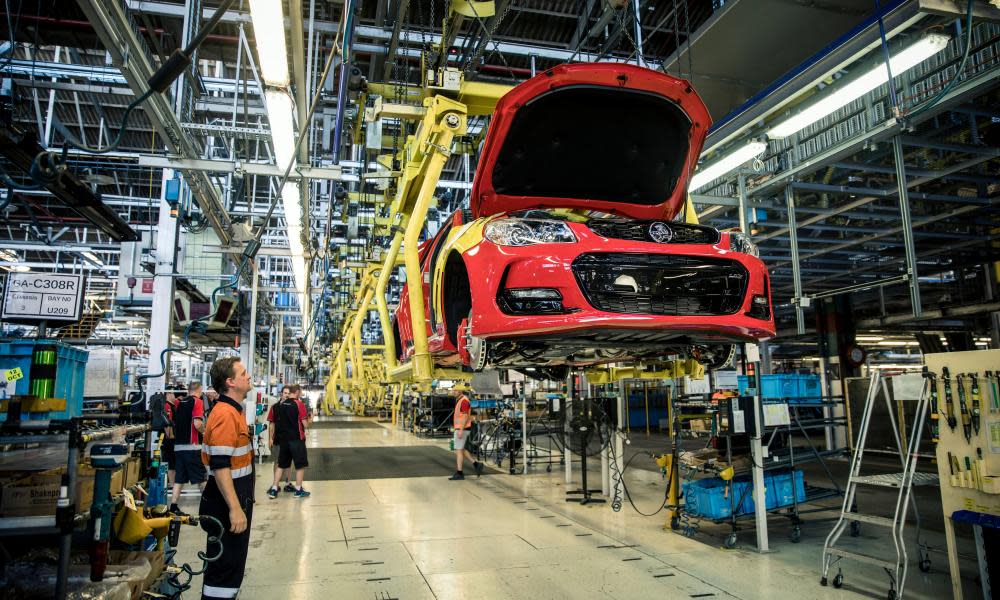Angry Scott Morrison accuses GM of letting Holden 'wither away' after taking $2bn in subsidies

Scott Morrison has slammed General Motors’ decision to axe the Holden brand, accusing the US car giant of allowing the iconic Australian marque to “wither away” while accepting billions in taxpayer subsidies.
GM announced the end of Holden on Monday, saying it would exit the “highly fragmented right-hand-drive market” and “retire” the Holden brand by 2021.
The decision, three years after the company ceased production in Australia, means about 600 of the company’s remaining 800-person workforce in Australia and New Zealand will lose their jobs by the end of the year.
In a press conference in Melbourne on Monday, GM senior vice president Julian Blissett said the closure was “an issue of scale”.
“With the global consolidation of the automotive industry, it’s becoming increasingly challenging for us to support a brand and a business that operates in just two markets,” he said.
“In short, GM desperately wanted a successful and sustainable Holden in both Australia and New Zealand.
Related: Stuck in first gear: how Australia's electric car revolution stalled
“We implemented a number of alternative strategies but ultimately GM has taken the decision it’s unable to prioritise the significant investment required for Holden to be competitive and profitable long term.”
1/1 - All of us here at Ford Australia are saddened to hear the news that Holden will cease operations. Holden is an iconic brand that holds a special place in the heart of many Australians, and has done so much to shape the Australian automotive industry and the country...
— Ford Australia (@FordAustralia) February 17, 2020
Reacting to the announcement on Monday, Morrison said he was “angry” about the decision, “like I think many Australians would be”.
“Australian taxpayers put millions into this multinational company,” he said.
“They let the brand just wither away on their watch. Now they are leaving it behind. I think that’s very disappointing, that, over many years, more than $2bn was directly provided to General Motors for the Holden operations.
“I think the fact they took money from Australian taxpayers for all those years just to let the Holden brand wither on their watch, I think is disappointing.
“I think at the end of the day it shows throwing all that taxpayer money at them … they were never going to respect that.”
Work at the carmaker’s Port Melbourne site would be wound down by the end of June and the Lang Lang calibration facility would finish up in August, Blissett said.
Related: 'It's a bit of pride': the last Holden marks an end of car manufacturing in Australia
There are currently 185 Holden dealerships in Australia and Blissett said the company would offer a “fair package” of transition support for dealers and suppliers. He said the decision to exit the Australian and New Zealand market, as well as ceasing manufacture in Thailand, would cost GM “north of $1bn”.
Holden shuttered its Australian manufacturing in October 2017, forcing hundreds of job losses. In December it announced that it would pull the Commodore brand from showrooms after 42 years, as well as the Astra, due to dwindling sales.
Holden interim chairman and managing director, Kristian Aquilina, said the company had “chased down every conceivable option” to prevent the closure of the brand.
“We have had multiple rounds of discussions and tried to find a way to defy gravity,” he said.
“But the truth and the hard truth was there’s just no way to come up with a plan that would support a competitive and growing and flourishing Holden and also provide a sufficient return to our investors.”
GM’s president, Mark Reuss, said the company had “explored a range of options to continue Holden operations” but could not “overcome the challenges of the investments needed for the highly fragmented right-hand-drive market”.
“At the highest levels of our company we have the deepest respect for Holden’s heritage and contribution to our company and to the countries of Australia and New Zealand,” he said.
“After considering many possible options – and putting aside our personal desires to accommodate the people and the market – we came to the conclusion that we could not prioritise further investment over all other considerations we have in a rapidly changing global industry.”


